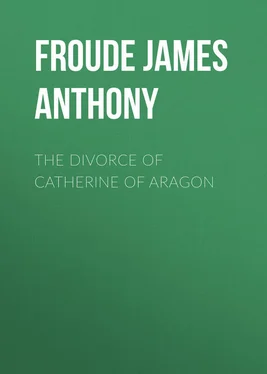James Froude - The Divorce of Catherine of Aragon
Здесь есть возможность читать онлайн «James Froude - The Divorce of Catherine of Aragon» — ознакомительный отрывок электронной книги совершенно бесплатно, а после прочтения отрывка купить полную версию. В некоторых случаях можно слушать аудио, скачать через торрент в формате fb2 и присутствует краткое содержание. Жанр: История, foreign_antique, foreign_prose, на английском языке. Описание произведения, (предисловие) а так же отзывы посетителей доступны на портале библиотеки ЛибКат.
- Название:The Divorce of Catherine of Aragon
- Автор:
- Жанр:
- Год:неизвестен
- ISBN:нет данных
- Рейтинг книги:4 / 5. Голосов: 1
-
Избранное:Добавить в избранное
- Отзывы:
-
Ваша оценка:
- 80
- 1
- 2
- 3
- 4
- 5
The Divorce of Catherine of Aragon: краткое содержание, описание и аннотация
Предлагаем к чтению аннотацию, описание, краткое содержание или предисловие (зависит от того, что написал сам автор книги «The Divorce of Catherine of Aragon»). Если вы не нашли необходимую информацию о книге — напишите в комментариях, мы постараемся отыскать её.
The Divorce of Catherine of Aragon — читать онлайн ознакомительный отрывок
Ниже представлен текст книги, разбитый по страницам. Система сохранения места последней прочитанной страницы, позволяет с удобством читать онлайн бесплатно книгу «The Divorce of Catherine of Aragon», без необходимости каждый раз заново искать на чём Вы остановились. Поставьте закладку, и сможете в любой момент перейти на страницу, на которой закончили чтение.
Интервал:
Закладка:
In the middle of October the Legate arrived. He had been ill in earnest from gout and was still suffering. He had to rest two days in Calais before he could face the Channel. The passage was wild. A deputation of Peers and Bishops waited to receive him at Dover. Respectful demonstrations had been prepared at the towns through which he was to pass, and a state ceremonial was to accompany his entrance into London. But he was, or pretended to be, too sick to allow himself to be seen. He was eight days on the road from the coast, and on reaching his destination he was carried privately in a state barge to the house provided for his residence. Wolsey called the next morning. The King was absent, but returned two days later to the Bridewell palace. There Campeggio waited on him, accompanied by Wolsey. The weather continued to frown. “I wish,” wrote Gerardo Molza to the Marchioness of Mantua, “that you could have seen the two Cardinals abreast, one on his mule, the other carried in his chair, the rain falling fast so that we were all drenched.” The King, simple man, believed that the documents which he held secured him. The Pope in sending the Legate had acted in the teeth of the Emperor’s prohibition, and no one guessed how the affair had been soothed down. The farce was well played, and the language used was what Henry expected. Messer Floriano, one of Campeggio’s suit, made a grand oration, setting out the storming of Rome, the perils of the Church, and the misery of Italy, with moving eloquence. The crowd was so dense in the hall of audience that some of the Italians lost their shoes, and had to step back barefoot to their lodgings through the wet streets.
The Legate was exhausted by the exertion, but he was not allowed to rest, and the serious part of the business began at once behind the scenes. He had hoped, as the Emperor said, that the case might be dropped. He found Henry immoveable. “An angel from heaven,” he wrote on the 17th of October, 42 42 Campeggio to Salviati and to Sanga, October 17, 1528. — Calendar, Foreign and Domestic , vol. iv. part 2, pp. 2099-2102.
“would not be able to persuade the King that his marriage was not invalid. The matter had come to such a pass that it could no longer be borne with. The Cardinal of York and the whole kingdom insisted that the question must be settled in some way.” One road out of the difficulty alone presented itself. The Emperor had insisted that the marriage should not be dissolved by Catherine’s consent, objecting reasonably that a judgment invalidating it would shake other royal marriages besides hers. But no such judgment would be necessary if Catherine could be induced to enter “lax religion,” to take vows of chastity which, at her age and under her conditions of health, would be a mere form. The Pope could then allow Henry to take another wife without offence to any one. The legitimacy of the Princess would not be touched, and the King undertook that the succession should be settled upon her if he had no male heir. The Queen in consenting would lose nothing, for the King had for two years lived apart from her, and would never return to cohabitation. The Emperor would be delivered from an obligation infinitely inconvenient to him, and his own honour and the honour of Spain would be equally untouched.
These arguments were laid before the Queen by both the Legates, and urged with all their eloquence. In the interests of the realm, in the interests of Europe, in the interests of the Church, in her own and her daughter’s interest as well, it would have been wiser if she had complied. Perhaps she would have complied had the King’s plea been confined, as at first, to the political exigencies of the succession. But the open and premature choice of the lady who was to take her place was an indignity not to be borne. She had the pride of her race. Her obstinacy was a match for her husband’s. She was shaken for a moment by the impassioned entreaties of Campeggio, and she did not at once absolutely refuse. The Legate postponed the opening of his court. He referred to Rome for further instructions, complaining of the responsibility which was thrown upon him. Being on the spot he was able to measure the danger of disappointing the King after the secret commission, the secret decretal, and the Pope’s private letter telling Henry that he was right. Campeggio wrote to Salviati, after his first interview with Catherine, that he did not yet despair. Something might be done if the Emperor would advise her to comply. He asked Fisher to help him, and Fisher seemed not wholly unwilling; but, after a few days’ reflection, Catherine told him that before she would consent she would be torn limb from limb; she would have an authoritative sentence from the Pope, and would accept nothing else; nothing should make her alter her opinion, and if after death she could return to life, she would die over again rather than change it. 43 43 Campeggio to Salviati, October 26, 1528. — Calendar, Foreign and Domestic , vol. iv. part 2, p. 2108.
Wolsey was in equal anxiety. He had set the stone rolling, but he could not stop it. If Clement failed the King now, after all that he had promised, he might not only bring ruin on Wolsey himself, but might bring on the overthrow of the temporal power of the Church of England. Catherine was personally popular; but in the middle classes of the laity, among the peers and gentlemen of England, the exactions of the Church courts, the Pope’s agents and collectors, the despotic tyranny of the Bishops, had created a resentment the extent of which none knew better than he. The entire gigantic system of clerical dominion, of which Wolsey was himself the pillar and representative, was tottering to its fall. If the King was driven to bay, the favour of a good-natured people for a suffering woman would be a poor shelter either for the Church or for him. Campeggio turned to Wolsey for advice on Catherine’s final refusal. The Pope, he said, had hoped that Wolsey would advise the King to yield. Wolsey had advised. He told Cavendish that he had gone on his knees to the King, but he could only say to Campeggio that “the King – fortified and justified by reasons, writings, and counsels of many learned men who feared God – would never yield.” If he was to find that the Pope had been playing with him, and the succession was to be left undetermined, “the Church would be ruined and the realm would be in infinite peril.”
How great, how real, was the dread of a disputed succession, appears from an extraordinary expedient which had suggested itself to Campeggio himself, and which he declares that some perplexed politicians had seriously contemplated. “They have thought,” he wrote on the 28th of October, “of marrying the Princess Mary to the King’s natural son [the Duke of Richmond] if it could be done by dispensation from His Holiness.” The Legate said that at first he had himself thought of this as a means of establishing the succession; but he did not believe it would satisfy the King’s desire. 44 44 Campeggio to Sanga, Oct. 28. — Calendar, Foreign and Domestic , vol. vi. part 2, p. 2113.
If anything could be more astonishing than a proposal for the marriage of a brother and sister, it was the reception which the suggestion met with at Rome. The Pope’s secretary replied that “with regard to the dispensation for marrying the son to the daughter of the King, if on the succession being so established the King would abandon the divorce, the Pope would be much more inclined to grant it.” 45 45 Sanga to Campeggio, Dec. – , 1528. — Calendar, Foreign and Domestic , vol. vi. part 2, p. 2210.
Clement’s estimate of the extent of the dispensing power was large. But the situation was desperate. He had entangled himself in the meshes. He had promised what he had no intention of performing. He was finding that he had been trifling with a lion, and that the lion was beginning to rouse himself. Again and again Wolsey urged the dangers upon him. He wrote on the 1st of November to Casalis that “the King’s honour was touched, having been so great a benefactor to the Holy See. The Pope would alienate all faith and devotion to the Apostolic See. The sparks of opposition which had been extinguished with such care and vigilance would blaze out to the utmost anger of all, both in England and elsewhere.” 46 46 Wolsey to Casalis, Nov. 1, 1528. — Ib. vol. iv. part 2, p. 2120.
Clement and his Cardinals heard, but imperfectly believed. “He tells us,” wrote Sanga, “that if the divorce is not granted the authority of the Apostolic See in England will be annihilated; he is eager to save it because his own greatness is bound up with ours.” The Curia was incredulous, and thought that Wolsey was only alarmed for himself. Wolsey, however, was right. Although opinions might have varied on the merits of the King’s request, people were beginning to ask what value as a supreme judge a pope could have, who could not decide on a point of canon law.
Интервал:
Закладка:
Похожие книги на «The Divorce of Catherine of Aragon»
Представляем Вашему вниманию похожие книги на «The Divorce of Catherine of Aragon» списком для выбора. Мы отобрали схожую по названию и смыслу литературу в надежде предоставить читателям больше вариантов отыскать новые, интересные, ещё непрочитанные произведения.
Обсуждение, отзывы о книге «The Divorce of Catherine of Aragon» и просто собственные мнения читателей. Оставьте ваши комментарии, напишите, что Вы думаете о произведении, его смысле или главных героях. Укажите что конкретно понравилось, а что нет, и почему Вы так считаете.












